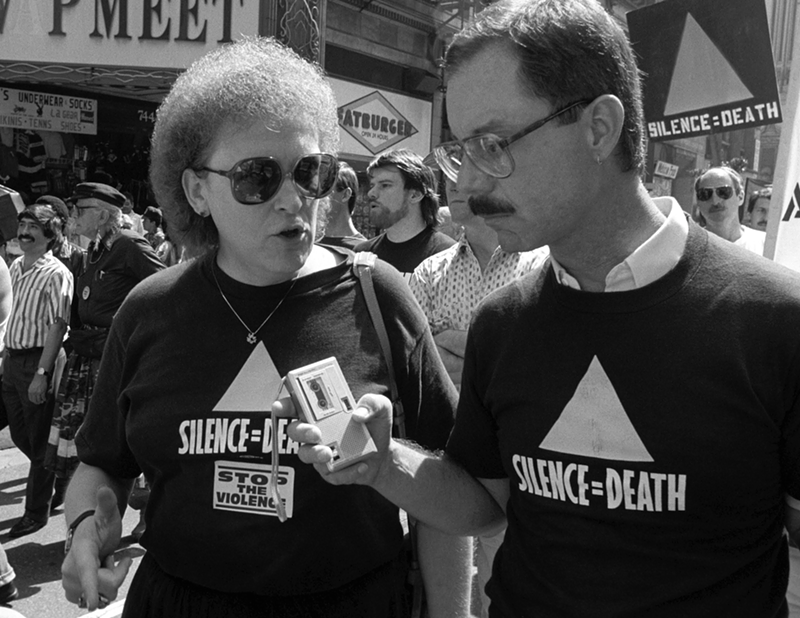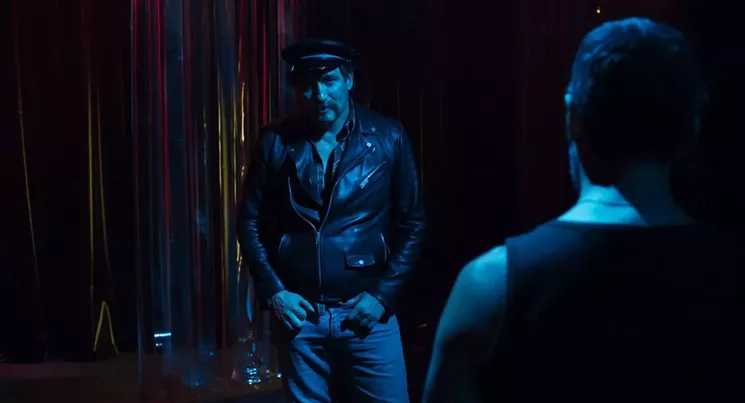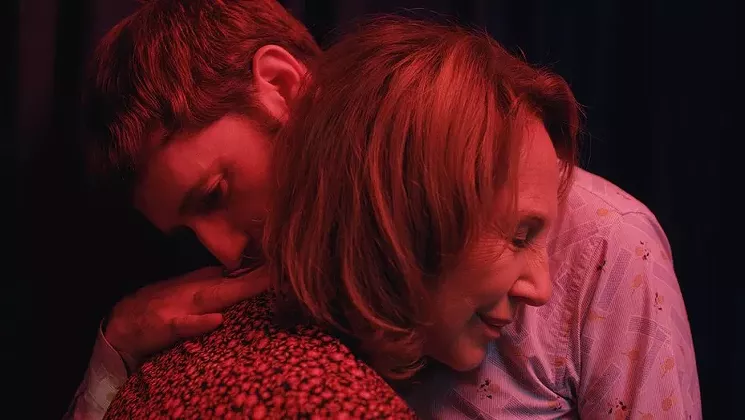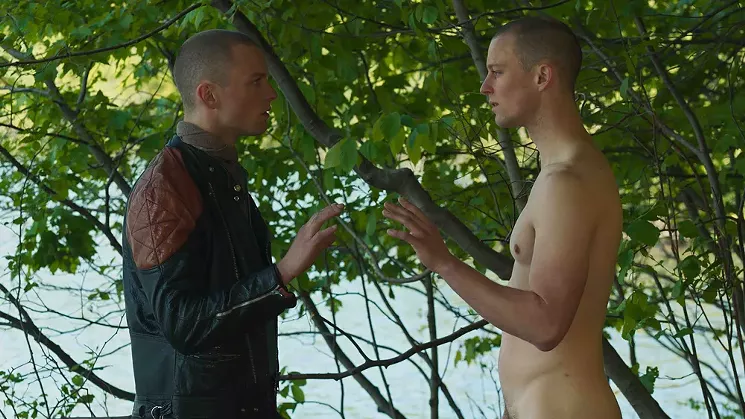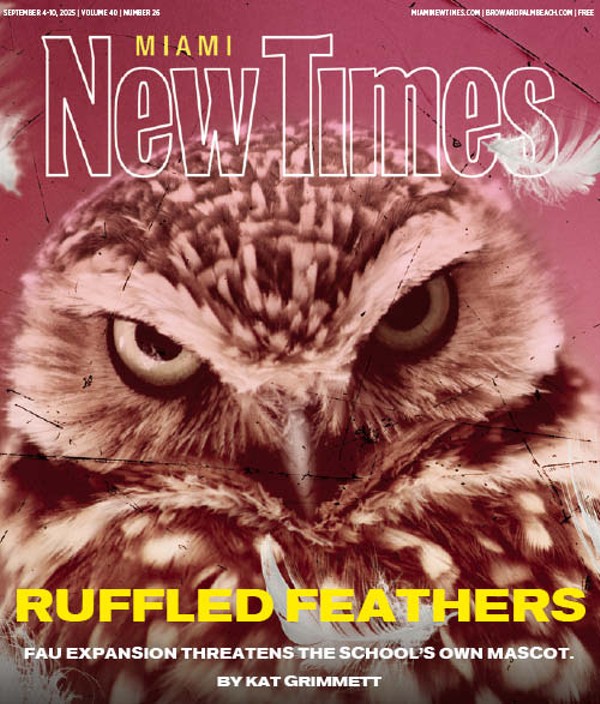The restraints have not deterred its organizers.
“No matter who you are and what your coming out journey has been, we have a film for you," executive director Victor Gimenez proudly proclaims.
Again, the festival is full of the latest LGBTQ+ cinema from around the world, including fiction, documentary, and a robust selection of short films with every genre, persuasion, and kink imaginable. Screenings will be predominately virtual, the notable exceptions being an opening night drive-in screening of Potato Dreams of America at the Dezerland Drive-In on Friday, and an open-air closing-night presentation of Charlatan at the Miami Botanical Gardens on May 2. Betwixt those bookends are nearly 50 events that showcase the best of queer filmmaking.
The festival has taken the pandemic parameters in stride and found ways to make screenings more accessible and enhance the viewing experience through longer rental periods and virtual Q&As with filmmakers on social-media channels. While everyone may not be able to enjoy a festival premiere in one another's company, Outshine is committed to bringing the queer community together through cinema.
Below, in alphabetical order, are a handful of highlights from this year's festival.
AIDS Diva: The Legend of Connie Norman
It's debatable whether AIDS Diva: The Legend of Connie Norman is uncannily timely or just an example of history perpetually repeating itself. A cornerstone of the queer film-festival circuit, the HIV/AIDS documentary often illustrates the perils of a public-health crisis entangled with political culture wars. This may sound familiar; there are fascinating parallels between Dante Alencastre’s documentary and our current pandemic predicament.The tenacity of its subject propels AIDS Diva. A wonderfully unapologetic, radical yet empathetic former drug addict and HIV-positive trans woman, Connie Norman is an example of translating fear into fearlessness. Taking her personal diagnosis, Norman championed political and social activism into the realm of progressive change and public policy. One fascinating portion of the documentary revolves around Norman’s ability to amplify her messaging through savvy use of media in an era before the democratization and ubiquity of social-media activism. The greatest success of Alencastre’s film lies in the way it cements Norman as a pivotal and essential member of ACT UP and corrects the trans-exclusionary bent throughout queer political history.
Constructed with interviews from Norman’s friends and colleagues as well as a treasure trove of archival footage, the documentary manages to balance the portrait of Norman’s personal life with her activism. With a total run time of around an hour, the film would benefit from taking a breath here and there to reflect and expand on certain aspects. Alencastre connects Norman’s course with other activist movements, like the fight for gun control, and overlooks others, like the Black Lives Matter movement, but does not dive deep enough. The shared importance of communication and knowledge, and the failure of institutions and the bravery and sacrifice of those who hold the powerful accountable, needs more time to marinate.
Toward the end of her life, in one of her final interviews, Norman laments, “The body is failing,” then characteristically shifts to, “but the soul is soaring.” The legend of Connie Norman is one of perseverance and progressivism, and Alencastre’s documentary is a worthy testament to that legacy. Screens virtually Saturday, April 24, through Wednesday, April 28. Trae DeLellis
Enfant Terrible
An enfant terrible is a young creative genius whose methods incite, insult, and irritate those around them. Oskar Roheler could not find a better title for his biopic about the provocative and prolific filmmaker Rainer Werner Fassbinder. For those unfamiliar with the iconic queer filmmaker, Enfant Terrible may bore or annoy. But Fassbinder aficionados will welcome a deep look into the chaotic behind-the-screen life of the controversial figure. Either way, it's worth pairing the film with some of Fassbinder’s classic films, which can be found on the Criterion Channel and HBO Max.On the technical side, Roheler and his creative team have accomplished something fascinating: They have crafted a biopic about Fassbinder that looks uncannily like an actual Fassbinder film. The spare and artificial set design coupled with the unnatural and neon lighting and the delightfully garish costuming all recall Fassbinder’s unique mise en scène. In addition, in the lead role, Oliver Masucci astonishingly transforms physically into Fassbinder and delivers a committed performance that captures the erratic and tyrannical director.
Yet despite all this commendable work, the film struggles to find an absorbing narrative structure or rhythm.
Though Enfant Terrible looks like a Fassbinder film, Roheler’s version finds itself trapped between Fassbinder’s polar extremes of cold intellectualism and lush melodrama. Enfant Terrible never manages to capture Fassbinder’s cinematic alchemy, the way the director transformed his provocations into powerful cinema. The resulting film is all id. The sadistic manipulation Fassbinder foists upon those around him begins to merge and turn monotonous. At one point, Fassbinder complains about not having created a masterpiece (an assertion most cinephiles would dispute) because “they can’t be made in a rush.” Enfant Terrible is also in a rush and never manages to develop any real insight into its subject.
The film captures the final 15 years of Fassbinder’s life as he moves from lover to lover, film to film. It dwells on his insatiable desire to create and his destructive drive for sex and drugs but it never really exposes his motivations or meaning. Enfant Terrible suggests that cancel culture would have ended Fassbinder’s career had it not been cocaine — he personified the toxic work environment. At a film festival press conference, Fassbinder summarized the titular character of Veronika Voss by declaring, "She let herself be destroyed.” That sentiment certainly echoes Fassbinder’s own life. Enfant Terrible feels disconnected from its titular character; the film never goes beyond the machinations of a manipulative monster to show the true genius behind the camera. Screens virtually Wednesday, April 28 through Sunday, May 2. Trae DeLellis
My Best Part
Queer people are messy. Nicolas Maury, as both actor and director, understands that all too well. In My Best Part (Garçon chiffon), Maury stars as Jérémie, a struggling gay actor who's going through it. He is obsessive, jealous, insecure, and practically on the verge of a nervous breakdown from the moment we meet him. Moving in with his soft-spoken mother (Nathalie Baye) prompts something of a forced awakening for them both: a realization that life, as they know it, could improve with some reflection.There is a casualness about the way Maury approaches everything. Even his own hysterics as a character, from wiping away his tears with his ex’s cum-stained tank top during a fight to questioning whether he’s too old to play a suicidal teenager, are strangely muted. It’s not at all a fault, though — more of an interesting experiment to see how much one can downplay melodrama. It does, however, occasionally result in some tonal inconsistencies. One moment it seems as though he’s aiming for absurdity, the next, it's sensibility.
As jarring as those shifts may be — especially when Maury introduces a musical number out of nowhere — My Best Part shows a lot of promise in him as a filmmaker and further reinforces what a compelling presence he is on screen. His work on the French series Call My Agent! and several past films have shown his considerable range and willingness to indulge in delightful self-deprecation destined to win over audiences. Though Maury does turn the lens on himself a little too much here, he allows several supporting performers a chance to shine in individual scenes, from Baye’s tender interactions with her son to Laure Calamy’s hilarious and almost entirely frivolous outburst. Screens virtually from Wednesday, April 28, through Sunday, May 2. Juan Antonio Barquin
Saint-Narcisse
The name Bruce LaBruce calls to mind transgressive queer cinema, from fetishes and militant women to zombie fucking and the intersection of art and porn. For better or worse, LaBruce’s throughline as a filmmaker has been to rail against cultural norms. Saint-Narcisse, his latest, is in many ways one of his tamest works, yet it's not without the shamelessness of his oeuvre as a whole.Saint-Narcisse initially postures as a story about a narcissistic young man, Dominic (Félix-Antoine Duval), finding himself on a journey to find his mother upon discovering her existence. All the while, Daniel (also Félix-Antoine Duval) is in a remote monastery, being taken advantage of by a priest with a fetish for Saint Sebastian. Revealed to be twin brothers, their individual journeys connect in unique ways.
If this short synopsis sounds absurd, it most certainly is, and the film itself has no qualms about indulging in anything it so wishes. Full-frontal male nudity, twincest, sex in a laundromat while voyeurs watch, licking the feet of a bloody wax statue, self-flagellation upon masturbating to underwear catalogs — the list goes on and on. These scenes don’t exist to shock the audience but are comfortably baked into the film and the casual way it approaches transgression. It’s one thing to be a lazy provocateur, but LaBruce is more in tune with John Waters’ ability to play with pastiche and camp.
At times, it’s almost as if Saint-Narcisse was composed after a night of bingeing recent works from contemporary French filmmakers like Yann Gonzalez (Knife+Heart), Alain Guiraudie (Stranger by the Lake), and François Ozon (Double Lover). There's less polish to LaBruce’s film than the sheen that these works possess, but LaBruce's willingness to be outright comic is what makes a difference. The melding of its sense of humor with the sincerity with which it approaches the notion of building one’s own queer family — however odd, pansexual, and incestuous it might seem — is what imbues Saint-Narcisse with its charm. Screens virtually from Saturday, April 24, through Wednesday, April 28. Juan Antonio Barquin
Truman & Tennessee: An Intimate Conversation
Documentarian Lisa Immordino Vreeland made her mark by exploring the lives of eccentric creatives, first with her grandmother-in-law and Vogue editor Diana Vreeland, then with art collector Peggy Guggenheim and photographer Cecil Beaton. She continues this trend with her latest film, Truman & Tennessee: An Intimate Conversation, this time turning her eye toward two queer literary icons from the South, Truman Capote and Tennessee Williams. In what Capote called “an intellectual friendship,” Immordino Vreeland charts the lives of these two legends, in their own words.The director’s past subjects all shared a distinct and pronounced visual component that's absent from Truman & Tennessee. Instead, the film relies heavily on audio to create the conversation between its protagonists. Utilizing recorded interviews from Capote and Williams combined with voiceover work (of varying success) by actors Jim Parsons as Capote and Zachary Quinto as Williams, Immordino Vreeland creates an informative and expansive wall of sound that fleshes out the internal thoughts of Capote and Williams. Still, the film struggles to find a cohesive or compelling visual style and tries to overcompensate with distracting and dull imagery. With writers as its subjects, the documentary is in a bind as to how to give visual representation to their words. The director relies on film adaptations of both authors' works — a flawed exercise when you consider that Williams and Capote expressed dissatisfaction with those adaptations.
While the form could use more polish, the content is intriguing. Immordino Vreeland manages to unearth the commonalities between Capote and Williams while respecting their unique individuality. Both gay, both Southern, both the products of neglected upbringings who remade themselves in New York City — yet they held very different worldviews. Capote and Williams only share the screen in a few photos. There is no actual discussion between the two literary titans. Rather, Immordino Vreeland juxtaposes each man's thoughts on the creative process, celebrity, addiction, and jealousy to construct an intimate conversation.
The film creates a sense of nostalgia for a time with larger-than-life literary celebrities. Even their late-night talk-show appearances stand out. They came of age at a time when interviewers were eager to interrogate and deeply examine life and creativity rather than today’s barren landscape of wannabe viral video content. While not as interesting as last year’s The Capote Tapes, Truman & Tennessee yields undeniable insights into both its subjects and signals that an in-depth documentary about Tennessee Williams would be very welcome. This may not be the definitive study of Capote or Williams, but Truman & Tennessee does what a good documentary should: inform, stimulate interest in the subject, and inspire supplemental research. Screens virtually from Wednesday, April 28, through Sunday, May 2. Trae DeLellis

